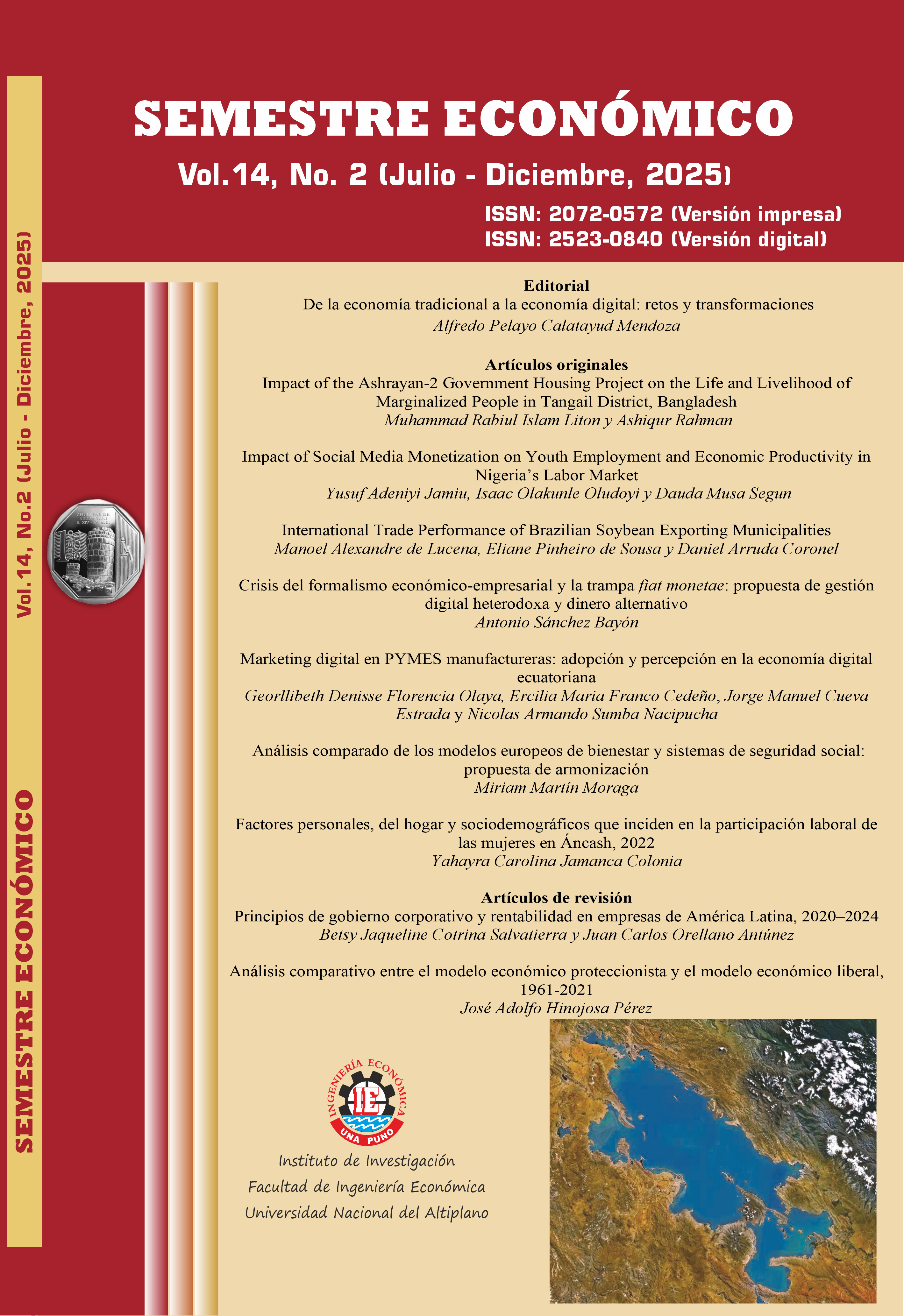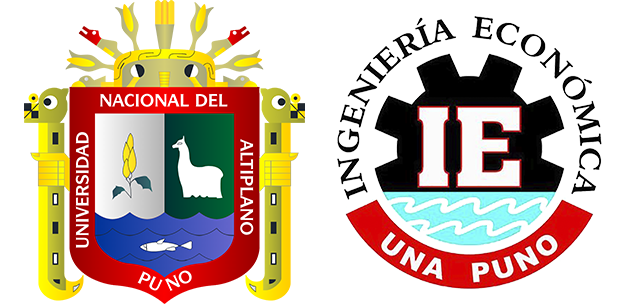Crisis del formalismo económico-empresarial y la trampa fiat monetae: propuesta de gestión digital heterodoxa y dinero alternativo
DOI:
https://doi.org/10.26867/se.2025.v14i2.190Palabras clave:
Gestión digital heterodoxa, dinero alternativo, prendizaje basado en experiencia de aula, tecnovación, monedas digitales socio-empresariales, responsabilidad social corporativa.Resumen
¿Por qué el formalismo econométrico de la síntesis neoclásica no funciona en la economía digital y cómo puede emprenderse privadamente para superar la crisis financiera derivada de la moneda fiat? Mediante los marcos teóricos y metodológicos heterodoxos, se ofrece aquí una revisión de los principales cambios derivados de la digitalización, que han puesto de manifiesto los fallos de los planteamientos mainstream y cómo superarlos con la revisión de la teoría del dinero y la práctica con monedas digitales socio-empresariales (MDSE), El objetivo principal es mostrar las ventajas del empleo de MDSE, como dinero alternativo (privado, participativo y descentralizado), que sirva para promover más intercambios y motivar a los agentes a ser más productivos y autónomos, a la vez que se facilita la coordinación de un orden espontáneo que redunde en el beneficio socio-ambiental.
Referencias
Alcorn, S., Solarz, B. (2006). The autistic economist. Post-Autistic Economics Review, 38: 13-19.
Alonso, M.A., Sánchez-Bayón, A. (2024). Spanish Boom-bust Cycle Within the Euro Area: Credit Expansion, Malinvestments & Recession (2002-2014). Politická ekonomie, 72(4):597-625 https://doi.org/10.18267/j.polek.1429
Alonso, M. A., Sánchez-Bayón, A., Castro-Oliva, M. (2023). Teoría austriaca del ciclo económico aplicada al caso español: del inicio del euro a la gran recesión y su recuperación. Revista De Métodos Cuantitativos Para La Economía Y La Empresa, 35, 280–310. https://doi.org/10.46661/revmetodoscuanteconempresa.6837
Ammous, S. (2018). El patrón Bitcoin: la alternativa descentralizada a los bancos centrales (trad.). Barcelona: Deusto.
Anderson M (1986) The Unfinished Agenda: Essays on the Political Economy of Government Policy in Honour of Arthur Seldon. London: Institute of Economic Affairs.
Andreessen, M. (2014). Why Bitcoin Matters, New York Times (URL: https://dealbook.nytimes.com/2014/01/21/why-bitcoin-matters/; consultado en mayo de 2020).
Andresen, L., Boud, D., & Cohen, R. (2020). Experience-based learning. In Understanding adult education and training (pp. 225-239). Routledge.
Andreu, A., Sánchez-Bayón, A. (2019). Claves de Administración y Dirección de Empresas en la Posglobalización, Madrid: Delta Publicaciones.
Bailey, B.J. (1998). The luddite rebellion. New York: NYU Press.
BCE (2020). A deep dive into crypto financial risk (URL: A deep dive into crypto financial risks: stablecoins, DeFi and climate transition risk (europa.eu); consultado en diciembre de 2023).
Bachiller, P., y Badía, G. (2020). The flip teaching as tool to improving students’ sustainable learning performance in a financial course. Sustainability, 12(23), 9998.
Ballantine, J. y McCourt, P. (2009). Accounting undergraduates' perceptions of cooperative learning as a model for enhancing their interpersonal and communication skills to interface successfully with professional accountancy education and training. Accounting Education: an international journal, 18(4-5), 387-402.
Barrows, H. (1986). A taxonomy of problem based learning methods. Medical Education, 20, 481-486.
Barrows, H. S. (1996). Problem‐based learning in medicine and beyond: A brief overview. New directions for teaching and learning, 1996(68), 3-12.
Beagon, Ú., Niall, D., y Ní Fhloinn, E. (2019). Problem-based learning: student perceptions of its value in developing professional skills for engineering practice. European Journal of Engineering Education, 44(6), 850-865.
Beker, V. (2010). On the economic crisis and the crisis of economics. Real-world Economics Review, 56: 72–94.
Berentsen, A. (2018). A Short Introduction to the World of Cryptocurrencies. St. Louis: Federal Reserve Bank of St. Louis.
Bernanke, B. (2004). The Great moderation, Kansas City: FED.
Bindseil, U. (2019). Central Bank Digital Currency: Financial System Implications and Control, International Journal of Political Economy, 48(4), 303-335
Boettke, P., Haeffele-Balch, S., Storr, V. (2016). Mainline Economics. Arlington: Mercatus Center-George Mason University
Buchanan, J., Tullock, G. (1962). The calculus of consent. Ann Arbor: University of Michigan Press.
Cassel, G. (1923). The theory of social economy (trans. J. McCabe). London: Fisher Unwin Limited.
Castaño J (2001) Discusión francesa sobre la enseñanza de la economía. Cuadernos de Economía, 20(35): 287-296.
Chen, Z., Mirza, N., Huang, L., & Umar, M. (2022). Green banking—can financial institutions support green recovery? Economic Analysis and Policy, 75, 389-395.
Conley, J.P. (2017). Blockchain and the Economics of Crypto-tokens and Initial Coin Offerings. Vanderbilt University Press.
Cortés, F. (2008). Las monedas sociales, Almería: Cajamar.
Corrons, A. (2017). Monedas complementarias: dinero con valores, Revista Internacional de Organizaciones, 18: 109–134.
Coyle, D. (2012). What’s the use of economics? Teaching the dismal science after the crisis. London: London Publishing Partnership.
Cubeiro, J.L. (2012). Del capitalismo al talentismo, Bilbao: Univ. Deusto.
Cueva, J., Sánchez-Bayón, A. (2024a). Estudio bibliométrico de Economía Digital y sus tendencias. Revista De Estudios Empresariales. Segunda Época, (1): 195–209. DOI: https://doi.org/10.17561/ree.n1.2024.8229
Cueva, J., Sánchez-Bayón, A. (2024b). Gestión de la Felicidad. Bibliometría y Tendencias. ANDULI, 26: 1-19. DOI: https://doi.org/10.12795/anduli.2024.i26.01
Demsetz, H. (2008). From economic man to economic system. Cambridge University Press, Cambridge.
Domenech, A., Sanchez-Bayón, A. (2024a). Cuestionando el modelo Bernanke-Blanchard en la Eurozona: Ilustración del caso español. Semestre Económico, 13(2), 55–69. https://doi.org/10.26867/se.2024.v13i2.171
Domenech, A., Sánchez-Bayón, A. (2024b). Revisión heterodoxa de la Macroeconomía convencional: discrepancias con el modelo Bernanke-Blanchard. Encuentros Multidisciplinares, 77: 1-14. Eurozona (encuentros-multidisciplinares.org)
Easterlin, R.A. (1974). Does Economic Growth Improve the Human Lot? en David, P., Reder, M. (eds.). Nations and Households in Economic Growth, New York: Academic Press Inc.
Easterlin, R.A., et al (2010). The happiness-income paradox revisited. Proceeding of the National Academy of Sciences, 107(52): 22463-68.
Edelman (2020). Edelman (URL: https://www.edelman.com/; consultado: abril de 2022).
Eggertsson, T. (1990). Economic behaviour and institutions. Cambridge: Cambridge University Press
Enciso, E. (2018). Las criptomonedas, el futuro de la economía mundial. (URL: https://www.utadeo.edu.co/es/noticia/destacadas/expeditio/264566/las-criptomonedas-el-futuro-de-la-economia-mundial; consultado: mayo 2021).
Escohotado, A. (2008). Los enemigos del comercio. Madrid: Espasa
Eucken, W. (1948). Soziale Marktwirtschaft (p.113-131), in Salin, E. (1948). Synopsis. Festgabe für Alfred Weber, Heidelberg: Schneider Heidelberg.
Felicetti, A. M., Corvello, V., & Ammirato, S. (2024). Digital innovation in entrepreneurial firms: a systematic literature review. Review of Managerial Science, 18(2), 315-362.
Field, A. (1999). New Economic History and Law and Economics, en VV.AA. (1999). Elgar Encyclopedia of Law and Economics. Cheltenham: E.E. Elgar, p. 728–753
Fortanet C, González C, Mira E, López J (2013) Aprendizaje cooperativo y flipped classroom, en Tortosa, M. T. et al (2013) XI Jornadas de Redes de Investigación en Docencia Universitaria. Alicante: Univ. Alicante, pp. 1151-1162. https://bit.ly/2s8AqgJ
Frey, B. (2018). Economics of Happiness, Basel: University of Basel & Springer.
FTC (2022). Guides for the Use of Environmental Marketing Claims (Green Guides). Washington: Federal Trade Commission.
Furubotn, E., Richter, R. (2005). Institutions and economic theory: the contribution of the new institutional economics, Ann Arbor: University of Michigan Press
Gallardo, I., et al. (2019). Análisis del anonimato aplicado a las criptomonedas. Río Cuarto: XXV Congreso Argentino de Ciencias de la Computación.
Gaus, G. (2020). A Branch on the Mainline: Hayek’s Analysis of Complex Adaptive Systems. Cosmos + Taxis, 7(5), 32-41.
García, D., Sánchez-Bayón, A. (2021). Cultural consumption and entertainment in the Covid-19 lockdown in Spain: Orange economy crisis or review? VISUAL REVIEW, 8(2): 131-149
García-Vaquero M, Daumann F, Sánchez-Bayón A. (2024). European Green Deal, Energy Transition and Greenflation Paradox under Austrian Economics Analysis. Energies, 17(15):3783 (1-16). https://doi.org/10.3390/en17153783
Glaser, F., et al. (2014). Bitcoin – Asset or currency? Revealing users´ hidden intentions. Tel Aviv: ECIS.
Goldschmidt, N. (2004). Alfred Müller-Armack and Ludwig Erhard: Social Market Liberalism, Freiburger Diskussionspapiere zur Ordnungsökonomik (nº4/12), Freiburg: Albert Ludwigs-Universität Freiburg.
González, E., Sánchez-Bayón, A. (2019). Nuevas tendencias en RR.HH. y desarrollo del talento profesional. Porto: Ed. Sindéresis.
Handrianto, C., & Rahman, M. A. (2018). Project based learning: a review of literature on its outcomes and implementation issues. LET: Linguistics, Literature and English Teaching Journal, 8(2), 110-129.
Hayek, F. (1976). Denationalisation of money: the argument refined. An analysis of the theory and practice of concurrent currencies. London: The Institute of Economic Affairs.
Hayek, F. (1988). The Fatal Conceit: The Errors of Socialism. Chicago: The University of Chicago Press.
Hoppe, H.H. (1995). Economic Science and the Austrian Method. Auburn: Mises Institute.
Huerta de Soto, J. (1998). Dinero, crédito bancario y ciclos económicos. Madrid: Unión Editorial.
Huerta de Soto, J. (2000). La Escuela Austriaca. Madrid: Síntesis.
Huerta de Soto, J. (2009). The theory of the dynamic efficiency. London: Routledge
Huerta de Soto, J., Sánchez-Bayón, A., Bagus, P. (2021). Principles of Monetary & Financial Sustainability and Wellbeing in a Post-COVID-19 World: The Crisis and Its Management. Sustainability, 13(9): 4655 (1-11). https://doi.org/10.3390/su13094655
Hülsmann, J.G. (2012). Theory of Money and Fiduciary Media: Essays in Celebration of the Centennial. Auburn: Mises Institute
Hülsmann, J.G. (2007). Mises: The Last Knight of Liberalism. Alabama: Mises Institute
Karsten, S. (1985). Eucken´s ´Social Market Economy´ and its test in post-war West Germany: the economist as social philosopher developed ideas that paralleled progressive thought in America. The American Journal of Economics and Sociology, 44(2): 169-183.
Keynes, J. (1930). Economic Possibilities for our Grandchildren. London: Macmillan.
Kollmann, T., Kleine-Stegemann, L., de Cruppe, K., & Strauss, C. (2022). Eras of digital entrepreneurship: connecting the past, present, and future. In VV.AA. Handbook of digital entrepreneurship (pp. 49-73). Edward Elgar Publishing.
Kurzweil, R. (2005). The Singularity is Near. New York: Penguin Group.
Lakomski-Laguerre, O., Desmedt, L. (2015). L’alternative monétaire Bitcoin : une perspective institutionnaliste. Revue de la régulation. Capitalisme, institutions, pouvoirs, 18: 1-22. https://journals.openedition.org/regulation/11489
Lansky, J. (2018). Possible state approaches to cryptocurrencies. Journal of Systems integration. 9(1): 19-31.
Mankiw, N.G. (2006). The Macroeconomist as Scientist and Engineer. Journal of Economic Perspectives, 20(4): 29-46. DOI: 10.1257/jep.20.4.29
Mariana, I. (1599). De rege et regis institutione. Toleti: apud Petrum Rodericum (escaneado por Univ. Valladolid, URL: Ioannis Marianae…De rege et regis institutione libri III...(uva.es); SC_12527.pdf. http://uvadoc.uva.es/handle/10324/34751)
Ménard, C., Shirley, M. (2012). New institutional economics from early intuition to a new paradigm? Ronald Coase Institute Working Paper (no. 2).
Miquel, A. B., & Sánchez Bayón, A. (2025). Mejoras y ajustes del PIB: ¿cómo medir un bienestar más realista? FACE: Revista De La Facultad De Ciencias Económicas Y Empresariales, 25(1), 5–23. https://doi.org/10.24054/face.v25i1.3571
Miragaya-Casillas, C., Aguayo-Estremera, R., Ruiz-Villaverde, A. (2023). University students, economics education, and self-interest. A systematic literature review. International Review of Economics Education, 43: 100266. https://doi.org/10.1016/j.iree.2023.100266
Mises, L. (1912). Theorie des Geldes und der Umlaufsmittel. Wien: Verlag von Duncker & Humblot
Mises, L. (1949): Human action. A treatise on Economics. New Haven: Yale Univ. Press.
Mises, L. (1978). Notes and Recollections, South Holland: Libertarian Press.
Moore, G. (1965). Cramming more components onto integrated circuits. Electronics, 38(8): 114-120.
Mougayar, W., (2016). The Business Blockchain. Hoboken: John Wiley & Sons Inc.
Müller-Armack, A. (1953). Soziale Marktwirtschaft
Murphy, R.P. (2011). Study Guide to The Theory of Money and Credit. Auburn, Alabama: Mises Institute.
Murphy, R.P. (2015). Let There Be Money: The free market has its own brand of fiat. Foundation for Economic Education: The Freeman (www.fee.org).
Nakamoto, S. (2008a). Bitcoin: A Peer-to-Peer Electronic Cash System (URL: bitcoin.pdf & Bitcoin: A Peer-to-Peer Electronic Cash System | Satoshi Nakamoto Institute; consultado en septiembre de 2023).
Nakamoto, S. (2008b). Bitcoin P2P e-cash paper (URL: Bitcoin P2P e-cash paper | Satoshi Nakamoto Institute; consultado en septiembre de 2023).
North, D. (1971). Institutional change and economic growth. Journal of Economic History, 31(1):118–125
North, D. (1984). Transaction costs, institutions, and economic history. J. Inst. Theor. Econ., 140:7–17
North, D. (1990). Institutions, Institutional Change and Economic Performance. Cambridge: Cambridge University Press.
Ostrom, E. (2005). Understanding institutional diversity. Princeton: Princeton University Press.
Oloyede, A. A., Faruk, N., Noma, N., Tebepah, E., & Nwaulune, A. K. (2023). Measuring the impact of the digital economy in developing countries: A systematic review and meta-analysis. Heliyon, 9(7). e17654. doi: 10.1016/j.heliyon.2023.e17654
Ozili, P. K. (2023). Central bank digital currency research around the World: a review of literature. Journal of Money Laundering Control, 26(2), 215-226.
PAE (2000)- post-autistic economics newsletter (URL: Issue no. 1, Post-Autistic Economics Newsletter (paecon.net); consultado oct. 2021).
Parlamento Europeo (2022). Cryptocurrency dangers and the benefits of EU legislation (URL: Cryptocurrency dangers and the benefits of EU legislation | Topics | European Parliament (europa.eu); consultado dic. 2023).
Paul, J., Alhassan, I., Binsaif, N., & Singh, P. (2023). Digital entrepreneurship research: A systematic review. Journal of Business Research, 156, 113507.
Pérez-Espés, C., Cea D’Ancona, F., Cervera Oliver, M. (2022). ¿Cómo fomentar las competencias profesionales? Aplicación del Aprendizaje Basado en Problemas en Contabilidad de Costes. Revista de Educación en Contabilidad, Finanzas y Administración de Empresas, 13: 17-39. https://dx.doi.org/10.12795/EDUCADE.2022.i13.03
Pettinger, T. (2021). Economics without the boring bits. London: Welbeck.
Pigou, A. C. (1920). The Economics of Welfare. London: Macmillan
Pühringer, S.; Bäuerle, L. (2018). What economics education is missing: The real world, Working Paper Serie, No. Ök-37, Cusanus Hochschule, Institut für Ökonomie und Institut für Philosophie, Bernkastel-Kues. https://hdl.handle.net/10419/196159
Purnomo, A., Susanti, T., Sari, A. K., Firdaus, M., & Dewi, R. (2020, August). A study of digital entrepreneurship through bibliometric visualizing from 1993 to 2019. In 2020 International Conference on Information Management and Technology (ICIMTech) (pp. 911-915). IEEE.
Rodrik D, Subramanian A, Trebbi F (2004) Institutions rule: the primacy of institutions over geography and integration, economic development. J Econ Growth 9:131–165
Rojas, M. (2014). El estudio científico de la felicidad, México DF: FCE.
Rothbard, M. (1962). Man, Economy, and State with Power and Market. Kansas City: William Volker Fund and D. Van Nostrand.
Rothbard, M. (1976). The Austrian Theory of Money (p. 160-84), in Dolan, E. (ed.). The Foundations of Modern Austrian Economics, Kansas City: Sheed Andrews and McMeel.
Rothbard, M. (1981). Money and the individual, foreword to Mises, L. (1981[1912]). The theory of money and credit. Liberty Fund Edition.
Ruben, B. D. (1999). Simulations, games, and experience-based learning: The quest for a new paradigm for teaching and learning. Simulation & Gaming, 30(4), 498-505.
Rutherford M (1994) Institutions in economics—the old and new institutionalism. Cambridge University Press, Cambridge
Sale, K. (1996). Rebels against the future: the luddites and their war on the industrial revolution: lessons for the computer age. New York: Basic Books.
Salerno, J.T. (1994). Ludwig von Mises's Monetary Theory in Light of Modern Monetary Thought. The Review of Austrian Economics, 8(1): 71-115.
Salerno, J.T. (2010). Money, Sound and Unsound. Auburn: Mises Institute.
Sánchez-Bayón, A. (2025). Revisión de las relaciones ortodoxia-heterodoxia en la Economía y la transición digital. Pensamiento, 81(314): 523-550. DOI:: 10.14422/pen.v81.i314.y2025.012
Sánchez-Bayón, A. (2024a). Revitalización de la disputa del método en economía: revisión científica y docente. Encuentros Multidisciplinares, 76: 1-14
Sánchez-Bayón, A. (2024b). Análisis neoinstitucional de la cuestión de género: paradoja y efectos indeseados. Dixi, 26(1): 1-43. DOI: https://doi.org/10.16925/2357-5891.2024.01.01
Sánchez-Bayón, A. (2024c). Ortodoxia versus heterodoxias sobre la colonización del Oeste estadounidense por empresas religiosas e ideológicas. Carthaginensia, 40(77): 117-156. DOI: https://doi.org/10.62217/carth.457.
Sánchez-Bayón, A. (2023). Análisis heterodoxo del sector turístico español pos-COVID: fallos en reajuste digital del empleo y vulnerabilidad empresarial, Estudios económicos, 40(81): 223-252, https://doi.org/10.52292/j.estu-decon.2023.3438
Sánchez-Bayón, A. (2022a). Crítica del positivismo formalista en Economía y las alternativas heterodoxas para la economía digital. Encuentros Multidisciplinares, 71: 1-16.
Sánchez-Bayón, A. (2022b). ¿Crisis económica o economía en crisis? Relaciones ortodoxia-heterodoxia en la transición digital. Semestre Económico, 11(1): 54–73 doi: http://dx.doi.org/10.26867/se.2022.1.128
Sánchez-Bayón, A. (2022c). De la Síntesis Neoclásica a la Síntesis Heterodoxa en la economía digital. Procesos de Mercado, 19(2): 277-306. https://doi.org/10.52195/pm.v19i2.818
Sánchez-Bayón, A. (2022d). La Escuela Económica Española y su relación con los enfoques heterodoxos. Semestre Económico, 25(58): 1-28. https://doi.org/10.22395/seec.v25n58a2
Sánchez-Bayón, A. (2022e). Lectura heterodoxa de la transformación digital europea del turismo: paradojas y fallos por el cambio de modelo. Atlantic Review of Economics-AROEC, 5(2), 1-18
Sánchez-Bayón, A. (2021a). Urgencia de una filosofía económica para la transición digital: Auge y declive del pensamiento anglosajón dominante y una alternativa de bienestar personal, Miscelánea Comillas. Rev. Ciencias Humanas y Sociales, 79(155): 521-551. DOI: https://doi.org/10.14422/mis.v79.i155.y2021.004
Sánchez-Bayón, A. (2021b). Balance de la economía digital ante la singularidad tecnológica: cambios en el bienestar laboral y la cultura empresarial. Sociología y Tecnociencia, 11(2). 53-80. DOI: https://doi.org/10.24197/st.Extra_2.2021.53-80
Sánchez-Bayón, A. (2021c). Giro hermenéutico y revolución copernicana en Ciencias Económicas: Regreso a las raíces y disciplinas duales. Encuentros multidisciplinares, 23(68): 1-26
Sánchez-Bayón, A. (2021d). Economía de bienestar personal: cómo la digitalización y el efecto reajuste mejoran las relaciones laborales y los procesos productivos. Revista Argentina de Investigación en Negocios-RAIN, 7(2): 25-52
Sánchez-Bayón, A. (2020a). Renovación del pensamiento económico-empresarial tras la globalización, Bajo Palabra, 24: 293-318 DOI: https://doi.org/10.15366/bp.2020.24.015
Sánchez-Bayón, A. (2020b). Una historia epistemológica de los estudios de ciencias jurídicas y económicas. Derecho y Cambio Social, 62: 468-498.
Sánchez-Bayón, A. (2020c). Estudios económicos en la encrucijada, Semestre Económico, 23(55), 47-66. DOI: https://doi.org/10.22395/seec.v23n55a2
Sánchez-Bayón, A. (2019a). Una historia crítica de sociología del trabajo y de las organizaciones: de “trabajadores de cuello azul y blanco” a “Knowmads & freeriders”. Miscelánea Comillas, 77(151), 431-451.
Sánchez-Bayón, A. (2019b). Transición a la Economía GIG. Encuentros multidisciplinares, 21(62), 1-19.
Sánchez-Bayón, A. (2019c). Retos jurídico-sociales relativos al fin de recursos humanos y la emergencia de talento, Revista Gral. Derecho del Trabajo y de la Seguridad Social-Iustel (nº54), 2019: 424-440
Sánchez-Bayón, A. (2019d). Talentismo: del fin de los recursos humanos a la emergencia del talento, Rev. Relaciones Laborales/Lan Harremanak, 42: 178-196 DOI: https://doi.org/10.1387/lan-harremanak.21077
Sánchez-Bayón, A. (2018). Estudio de la idiosincrasia estadounidense desde su Teología política y Ciencias Eclesiásticas, Estudios Eclesiásticos, 93(364): 165-204
Sánchez-Bayón, A. (2017). Revelaciones conceptuales y lingüísticas de la posglobalización: Retos de construcción moral de la sociedad del conocimiento y aportes del humanismo hispánico. Carthaginensia, 33(64): 411-58
Sánchez-Bayón, A. (2016). Problemas y retos para alcanzar la sociedad del conocimiento. Madrid: Delta Publicaciones.
Sánchez-Bayón, A., Arpi, R. (2024). Disputa del método en Economía: monismo vs. pluralismo. Ad-gnosis, 13(14). e-711 (1-20). https://doi.org/10.21803/adgnosis.13.14.711
Sánchez-Bayón, A., Miquel-Burgos, A. B., & Alonso-Neira, M. Ángel. (2025a). Experience of learning technovation for i-entrepreneurship training: how to prepare the students for digital economy? Estrategia y Gestión Universitaria, 13(1), e8765. https://doi.org/10.5281/zenodo.14908364
Sánchez-Bayón, A., Castro-Oliva, M., & Sastre, F. J. (2025b). Revisión de la teoría austriaca del ciclo económico. Desafíos: Economía Y Empresa, 6: 119-143. https://doi.org/10.26439/ddee2025.n6.6927
Sánchez-Bayón, A., Alonso-Neira, M.A., Morales, D. (2024a). Aprender a emprender con IA y método de talento digital: Revisión de responsabilidad social universitaria. Iberoamerican Business Journal, SI 1(1): 48 – 63. DOI: https://doi.org/10.22451/5817.ibj2024.Spec.Ed.vol1.1.11094
Sánchez-Bayón, A., Alonso, M.A., Miquel, A.B., Sastre, F.J. (2024b). Aprendizaje creativo e innovación docente sobre RSC 3.0, ODS y divisas alternativas. Encuentros Multidisciplinares, 78: 1-13
Sánchez-Bayón, A., Pellejero, C., Luque, M. (2024c). Una revisión de la producción científico-académica sobre turismo en la Unión Europea (2013-23). Iberian Journal of the History of Economic Thought, 11(1): 55-64
Sánchez-Bayón, A., Urbina, D., Alonso-Neira, M.A, & Arpi, R. (2023a). Problema del conocimiento económico: revitalización de la disputa del método, análisis heterodoxo y claves de innovación docente. Bajo Palabra, (34), 117–140. https://doi.org/10.15366/bp2023.34.006
Sánchez-Bayón, A., Alonso-Neira, M.A., Castro-Oliva, M. (2023b). Revisión de la innovación docente e investigadora de la Macroeconomía del capital y sus ciclos. Procesos de Mercado, 20(1): 173-218.
Sánchez-Bayón, A., Castro-Oliva, M. (2023c). Fundamentos de la Escuela Austriaca sobre el capital y los ciclos económicos e invitación al diálogo con la síntesis neoclásica. ATLANTIC REVIEW OF ECONOMICS – AROEC, 6(2): 1-36
Sánchez-Bayón, A., Castro-Oliva, M. (2023d). Gestión heterodoxa de crisis económicas periódicas: Desarrollos de la teoría austriaca del ciclo y del capital. Economía & Negocios, 5(1), 19–51. https://doi.org/10.33326/27086062.2023.1.1594
Sánchez-Bayón, A., Castro-Oliva, M. (2022). Historia de la reciente deflación del capital y los salarios en España: Revisión de los desarrollos de la teoría de ciclos económicos. Iberian Journal of the History of Economic Thought, 9(2), 111-131. https://doi.org/10.5209/ijhe.82760
Sánchez-Bayón, A., Trincado, E., Valero, J. (2022). Religión y Economía en la vertebración de EE.UU. Anuario de Derecho Eclesiástico del Estado, 38: 639-703.
Sánchez-Bayón, A., García-Ramos, M.A. (2021). A win-win case of CSR 3.0 for wellbeing economics. Revista de Estudios Cooperativos-REVESCO, 138, e75564: 1-11. DOI: https://doi.org/10.5209/reve.75564
Sánchez-Bayón, A., Trincado, E. (2021a). Spanish B-Schools Paradox and the accreditations system expiry: when the success becomes a risk, Revista Galega de Economía, 30(2), 6926, 1-18. DOI: http://dx.doi.org/10.15304/rge.30.2.6926
Sánchez-Bayón, A., Trincado, E. (2021b). Rise and Fall of Human Research and the Improvement of Talent Development in Digital Economy. Studies in Business and Economics, 16(3): 200-214. DOI: https://doi.org/10.2478/sbe-2021-0055
Sastre, F. J., García Vaquero, M., Sánchez Bayón, A., & Mazier, A. (2024). ¿Recuperación económica española vía Pacto Verde Europeo? Evaluación de empleos verdes y sus capacidades. Semestre Económico, 13(1), 43–64. DOI: https://doi.org/10.26867/se.2024.v13i1.162
Sethaput, V., & Innet, S. (2023). Blockchain application for central bank digital currencies (CBDC). Cluster Computing, 26(4), 2183-2197.
Smith, A. (1776). An Inquiry into the Nature and Causes of the Wealth of Nations. London: W. Strahan and T. Cadell
Torbet, G. (2022). 10 cualidades que definen a un buen economista (trad.). Inomics, 3 de marzo. https://bit.ly/3R8Wly6
Valero, J., Sánchez-Bayón, A. (2018). Balance de la globalización y teoría social de la posglobalización. Madrid: Dykinson.
van der Steen, M., Van Twist, M., & Frissen, P. (2017). Learning from experience: From case-based teaching to experience-based learning. Teaching Public Administration, 35(1), 105-125.
Viladecans (2020). ¿Qué es vilawatt? https://www.viladecans.cat/es/vilawatt [consulted: May, 2020].
Vizoso, C.Mª., Sánchez-Bayón, A. (2016). Hacia una universidad del 3er. Milenio. Reflexiones y experiencias docentes ABT (Aprendizaje Basado en Tecnología), Madrid: Delta Publicaciones
VV.AA. (2012a). Defining a New Economic Paradigm: The Report of the High-Level Meeting on Wellbeing and Happiness. New York: The United Nations (URL: Defining a New Economic Paradigm: The Report of the High-Level Meeting on Wellbeing and Happiness .:. Sustainable Development Knowledge Platform (un.org); consultado: mayo, 2021).
VV.AA. (2012b). World Happiness Report. New York: The United Nations (URL: World_Happiness_Report_2012.pdf; consultado: mayo, 2021).
WEF (2023). The Global Risks Report 2023. Geneva: Wold Economic Forum (WEF_Global_Risks_Report_2023.pdf (weforum.org)).
Williamson OE (1985) The economic institutions of capitalism: firms, marketing, relational contracting. Free Press, New York
Wolff, J. (2021). How is technology changing the world, and how should the world change technology?. Global Perspectives, 2(1), 27353. 10.1525/gp.2021.27353
Yeunglamko, L. K. (2011). From discontent to reform: towards a multidisciplinary approach to the study of economics. Australasian Journal of Economics Education, 8(1), 69-86.
Zanotti, G. (2012). Introducción a la Escuela Austriaca de Economía. Madrid: Unión Editorial
Zheng, Z., et al. (2017). An Overview of Blockchain Technology: Architecture, Consensus, and Future Trends. Conference paper, 25-30 june 2017, 2017 IEEE International Congress on Big Data (BigData Congress).
Publicado
Número
Sección
Licencia
Derechos de autor 2025 Antonio Sanchez-Bayón

Esta obra está bajo una licencia internacional Creative Commons Atribución 4.0.















